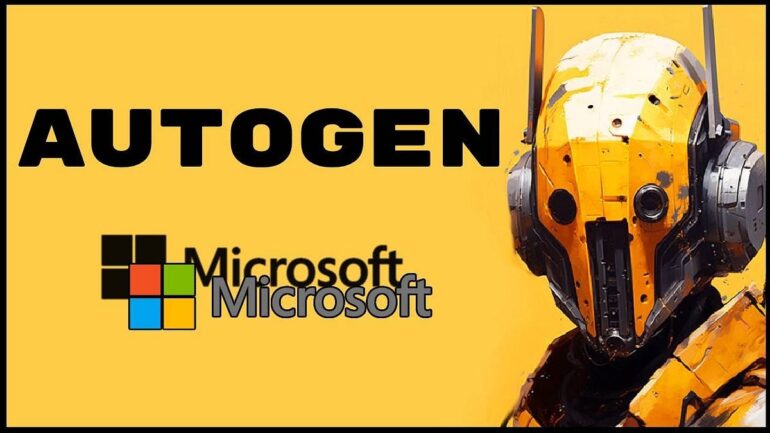TL;DR:
- Microsoft introduced AutoGen, an open-source Python library for orchestrating Large Language Model (LLM) workflows.
- AutoGen employs “agents,” LLM-powered modules communicating through natural language to execute tasks.
- Agents are customizable, using prompt engineering and external tools, creating a network of specialized agents.
- Human proxy agents can moderate AI agent interactions, enhancing user control and decision-making.
- AutoGen’s modular architecture fosters rapid custom application development with collaborative AI agents.
- Collaboration between AI agents can accelerate coding efficiency by up to four times.
- AutoGen competes with other LLM application frameworks like LangChain, LlamaIndex, AutoGPT, and more.
- LLM agents remain a hot research area, with applications from product development to market research.
- Despite challenges, the future of LLM applications is promising, with AutoGen reflecting the intensifying competition.
Main AI News:
In the competitive landscape of Large Language Model (LLM) application frameworks, Microsoft has introduced AutoGen, an open-source Python library designed to simplify and optimize the orchestration of LLM workflows. AutoGen’s core concept revolves around the creation of “agents,” autonomous programming modules driven by LLMs like GPT-4. These agents communicate with each other through natural language messages, collaborating seamlessly to accomplish diverse tasks.
What sets AutoGen apart is its versatility. Developers can customize and enhance these agents using prompt engineering techniques and external tools, allowing them to retrieve information or execute code. With AutoGen, it becomes possible to establish a network of specialized agents, each excelling in different domains, all working in harmony.
Imagine each agent as an individual ChatGPT session, each with its unique system instructions. One agent could serve as a programming assistant, generating Python code based on user requests, while another might function as a code reviewer, troubleshooting Python code snippets. The interaction between these agents is akin to a relay, where the output of one agent becomes the input for another. Some agents may even have access to external tools, equivalent to ChatGPT plugins like Code Interpreter or Wolfram Alpha.
AutoGen equips developers with the necessary tools to create and enable these agents to interact automatically. It’s available as open-source software under a permissible license, making it accessible to a broad community of developers.
The power of AutoGen extends to multi-agent applications, which can operate autonomously or with the guidance of “human proxy agents.” These human agents step into conversations between AI agents, adding a human touch to oversee and control processes. In essence, the human user becomes a team leader, directing a team of AI assistants.
Human agents prove invaluable in situations where sensitive decisions need user confirmation, such as making purchases or sending emails. They also enable users to steer AI agents in the right direction. Starting with an initial concept, users can refine and expand it gradually, making adjustments as they write code with the assistance of these AI agents.
AutoGen’s modular architecture empowers developers to create reusable components, assembling them rapidly to craft custom applications. Multiple AutoGen agents can collaborate to tackle intricate tasks efficiently. For instance, a human agent may seek assistance in writing code for a specific task. A coding assistant agent generates the code, which an AI user agent validates using a code execution module. Together, they troubleshoot and refine the code, with the human user able to intervene or provide feedback at any juncture. This collaborative approach can boost coding efficiency by up to four times, as per Microsoft’s claims.
AutoGen doesn’t stop at simplicity; it also supports complex scenarios like hierarchical arrangements of LLM agents. For instance, a group chat manager agent can moderate conversations between multiple human users and LLM agents, following predefined rules to relay messages.
In a rapidly evolving field, AutoGen faces competition from other frameworks like LangChain, LlamaIndex, AutoGPT, MetaGPT, BabyAGI, ChatDev, and Hugging Face’s Transformers Agents library. These frameworks cater to various LLM applications, from chatbots to text summarizers and multi-agent systems.
LLM agents represent a burgeoning area of research and development. Prototypes have emerged for tasks ranging from product development to executive functions, shopping, and market research. However, challenges like hallucinations and unpredictable behavior still impede their production-readiness.
Conclusion:
AutoGen’s entry into the market signifies a significant stride in LLM application frameworks. Its potential to enhance AI agent collaboration and streamline complex tasks has far-reaching implications. As the competition intensifies, businesses should explore the possibilities of harnessing AI agent ecosystems to boost efficiency and innovation in their operations.

